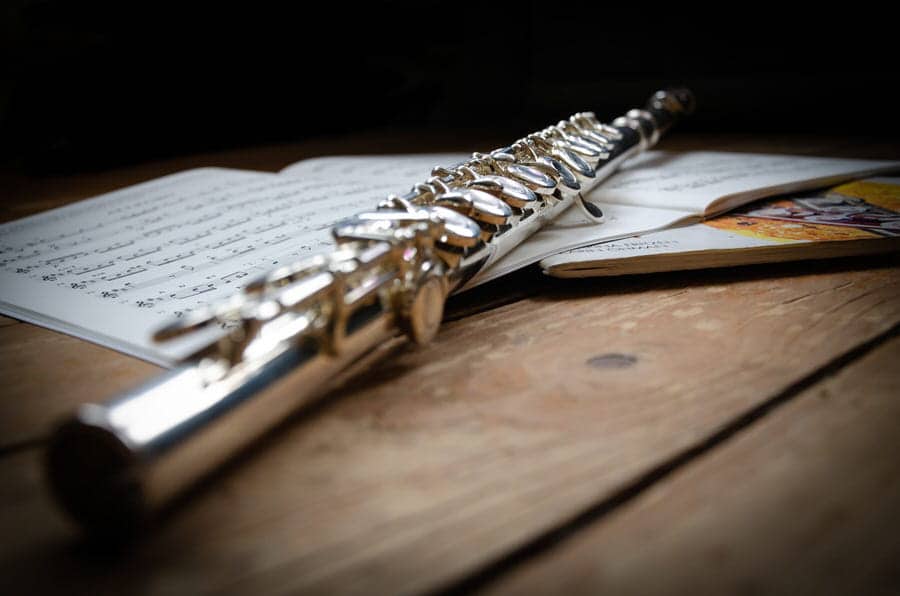Flute FAQ's
Frequently Asked Questions
Flute FAQs is a crucial segment of our ‘Beginner’s Guide To Learning The Flute’ series. If you have additional questions, don’t forget to sign up for 4 Feature Friday…

Choosing An Instrument
The flute is such a common instrument that it’s very, very difficult to choose a single model that fits a beginner. But that said, it’s still not impossible to find a good one from the extensive list. It all depends on the player’s needs, budget, and even age. A child who wants to learn for the first time is often not suited to have a higher-end flute intended for professionals. They would do better with something like curved head flute, for instance, which enables them to start learning on a proper instrument. A Nuvo plastic flute is an even lower risk investment and a great way to start as a young child.
All flutes intended for students will be closed hole flutes. These flutes allow beginners to get a good sense of the fingering technique. A closed hole flute enables them to press down on a key to fully cover a hole so they can play a note right. It’s easier and facilitates quicker learning. An open-hole flute, on the other hand, doesn’t have a key you can press down. This makes them more fitting for advanced players who already have a certain level of mastery of the instrument.
When choosing a flute for a complete beginner, never go for anything that looks too cheap. Because when it comes to flutes, you get what you pay for. Never ever choose something you can buy at a local supermarket because that’s closer to being a child’s toy rather than an instrument. Your best bet is to buy a closed hole silver-plated flute, with an E mechanism (otherwise known as a split E) and a C footjoint. This is the absolute baseline if you want something that will last and is set up properly for beginner to advanced learning.
Most of the advanced and professional-level flutes are silver or silver plated. Still, it’s not uncommon to see wooden flutes in the hands of either novices or even high-level pros. It’s important to remember that if you’re looking for a good standard flute, always go for the silver/silver-plated instrument. There would be cheaper flutes made of other metals such as nickel, but their quality and overall sound signature would pale in comparison to a silver one.
Maintenance
As a flute player, you should know how to clean both the inside and outside of your instrument. You can take a regular flute apart in three sections so you can clean it properly. Always use a specialised cleaning rod with a soft cloth for cleaning the insides of the tubes. Doing this removes the moisture inside which can be damaging in the long term if not kept under control. As for the outside, you can easily use another cloth with a silver cleaning solution. If you don’t have that, a duster is almost as effective. A flute care kit is must, but if you want the most thorough cleaning possible, take the instrument to a technician.
It’s because you haven’t maintained it well enough. All silver and silver-plated flutes (even those made of nickel or any other metal) can tarnish over time if you don’t polish it. Every single time you hold your instrument, the oils on your fingertips will build up and eventually ruin the shine of the exterior. Removing the tarnish is as simple as buying a specialised cleaner or silver polish, putting some on a soft cloth, and wiping the instrument down. If the tarnish proves to be stubborn, however, it might be time for you to take the instrument to a technician.
It’s hard to give an exact figure. The final price depends on the skill and experience level of the technician when it comes to re-padding. It will also depend on whether the flute itself needs a complete re-pad or a minor one. You will only need to re-pad your flute if it starts to feel like the holes don’t seal enough when you play notes. The only way you can have an exact quote is to visit a shop as soon as you can.
Flutes are delicate instruments and will need regular maintenance for them to last and sound good longer. We recommend that your flute undergo a COA (clean-oil-adjust) service once a year. This is assuming you have normal playing and maintenance habits. If you play more often than usual and fail to administer daily care regimen, then you’ll need to go for a COA more than once every year. Components such as pads will leak and the oil on the inside of the instrument’s mechanisms will eventually go bad. It is advisable to not wait to have maintenance until the problems show themselves. Prevention is better than cure, they always say, and it’s true for flutes as well.
When cleaning the inside of the tube, make sure to use highly absorbent cloth. You must also ensure that the cloth is sized perfectly with the hole; you wouldn’t want something that’s too thick because you won’t be able to twist it around inside. Also, there’s a good chance that a thick cloth will leave some lint inside the tube, which will trap any moisture and cleaner residue. As for cleaning the outside, your foremost goal is to clean off any acid and oil buildup on the surface. Use another lint-free, durable, absorbent cloth for the outside. The Jim Dunlop kit is an essential accessory to keep in your flute case.
Yes, but it depends highly on how much damage there is and where the dent is. Severe dents on parts such as the lip plate, keys, and tone holes will likely stay there forever. Call it “battle damage,” if you will. Another thing that will affect dent repair is the type of metal used in making the flute. The more malleable the metal is, the easier it will be to remove dents. But whenever a dent is possible to be removed, don’t expect that you will see the instrument as if a dent was never there. There will always be a slight variation in the way the repaired dent looks from the rest of the flute.
Tightening the screws on a flute is unlike tightening screws on anything else. There is always a level of variety in the tightness among flute makers and different models. You can’t hope to take a simple screwdriver and tighten the screw as much as you can. Your best bet is to take the instrument to a trained and experienced technician, because they will know how to tighten the screw properly. While you wait for your instrument to be serviced, avoid playing it for a while until the issue is fixed.
The amount of service or repairs a flute needs after not being played for a while varies greatly. It depends on how long it was in storage, what the ambient temperature of the area is (too hot or too cold), how humid the storage area was, and how the instrument itself was stored (in a case or just lying on the floor). It’s important to remember as well that even the most durable of flutes will suffer from aging materials such as old oil and pads. The only way you can be certain is if you have a professional take a good, detailed look at the instrument’s condition.
As a player of a wind instrument, you should be well aware of how much bodily substances flutes take in on a daily basis. This is true for the flute, but also every other instrument in the wind family. Fail to clean your flute and the months, even years worth of spit and contaminants in it will attract unsavoury things like black mould. And when it does, it may cause a respiratory condition known as “Saxophone Lung.” Don’t be fooled by the name, for it doesn’t only affect saxophones and saxophone musicians. The very same thing can happen to your flute if you don’t clean it regularly. Make sure you’ve always got a cleaning kit in your case and make cleaning your flute part of your playing routine.
Black spots are due to oxidation. Silver or silver plating being exposed to oxygen (i.e. the air around you) can cause this. The black spots are unavoidable especially on older instruments which have seen the test of time. But when you do notice them, you can remove the spots using a specialised silver polish. Put the solution on a clean cloth, then wipe the instrument up and down, taking care not to push the keys. You can also limit the appearance of black spots by playing the flute everyday, even if for only a few minutes.
Yes, but not just any alcohol. You must always use denatured isopropyl alcohol. The most important area to clean on your flute with alcohol, however, is the embouchure hole. Saturate a cotton swab with the alcohol then clean around the hole thoroughly. You can also apply the alcohol on a cloth you attach to the cleaning rod, so you can clean off the inside of the tube. By using alcohol, your instrument will be basically disinfected. Don’t rely on it entirely, however, as you will still need specialised cleaners for the best effect.
Technique
It depends on what type of learner you are. There are people who learn better when somebody shows them how it’s done, and those who learn well when they’re teaching themselves. Formal instruction will often mean that there is a schedule and curriculum to follow. With a teacher, you will learn how to play the instrument from the absolute basics, step by step. It tends to present a more holistic approach to learning the flute. As for self-instruction, the biggest advantage is you can keep your own time and learn whichever skills you want. At the end of the day, you will have to choose which learning style fits your needs best. Our flute learning methods page is a great place to start.
Again, the answer depends on what kind of learner a player is. A fixed practice time allows for a steady pace of learning, where you don’t progress to more advanced skills until you’ve mastered the previous one. Or maybe you’ll feel like you learn better if you practice on your own time, whenever inspiration strikes and however long it may last. Or maybe you’d like a balance between stringent scheduling and freedom. The choice is yours. Check out our flute practice page for more inspiration.
It’s not uncommon to find flutists who can play music by ear. That only means they have a certain level of musicality that’s far beyond that of an average player’s. But if you’re a beginner who hopes to master the flute one day, you absolutely have to learn to read and play sheet music. Classical music is almost always played with sheet music and having sight reading skills means you can book orchestra gigs. Other types of music such as jazz, on the other hand, rely on improvisation and thus “playing by ear.” But unless you have a perfect ear, then learning to read sheet music is a must.
This is especially true for younger students, whose lung capacities aren’t on par with adults yet. The flute itself also does require a lot of air to produce sound, because only half the air you blow goes inside. The rest goes to waste. This is why breathing techniques are among the first things that students learn when studying the flute. Aside from these techniques, there are also tools such as the breathing bag and breath builder which will improve one’s lung capacity over time. So don’t fret if you feel like you can’t blow enough air into the flute at first. It takes time! Why not jump to our flute technique page to find out more ways to improve.
Since the flute is a rather common instrument, you can find a lot of flute teachers everywhere. But your best bet is to go to the nearest instrument rental shop, where there’s almost always a list of local instructors. And if you feel like traveling to the shop is a pain, then by all means Google flute teachers in your area. There’s always someone qualified close to where you are. Or in the event you can’t find a single teacher, you can opt to join flute learning groups and communities.
You already know the answer to this. Yes, of course! Like any other musical instrument, the flute requires a certain amount of dedication for you to sound good with it, if not master it. Practise allows your body to build up enough muscle memory and digest whatever concepts you learn every time down your flute journey. Practising also gives you an avenue to see your improving skills in action, which is very rewarding to see! With enough work, you will see and hear your progress, which is a very thrilling feeling in itself. Get inspired by checking out our flute practice page.
About the Author
Chloë Vincent
Twitter - @chloeflute
General Flute FAQs
In a way, yes. We’ve already mentioned that the flute does require quite a bit of air for it to work. And if you get started learning the flute early in life, you will have to deal with a good amount of respiratory workout. Breath exercises and techniques are the norm for flute players regardless of level. And as such, they will eventually develop greater lung capacities than the average person. They won’t run out of breath that easy because of their inherent training.
Learning how to play the flute means learning to take care of your body. Improving your lung capacity and core strength is the most obvious health benefit. But there are others, as well. As you learn to play well, a number of fine motor skills will improve: hand-eye coordination, finger dexterity, core control, and proper posture. Mastering the flute also requires a healthy mind, which the player can develop through constant disciplined study. We’re not saying you’ll feel like a brand new person after learning the flute, but the health benefits are too good to ignore.
Literally any open tube you blow air into can be called a flute. That doesn’t mean they can make music, but that’s an interesting technicality nonetheless. The flute is also among the simplest yet oldest musical instruments on record. Even civilisations as old as the Ancient Sumerians played the flute, not to mention the Ancient Egyptians, Chinese, and Greeks. It seems that even the simplest action of blowing air through a hollow tube gave our oldest ancestors the idea of producing melodies.
If you consider modern media, you might notice that the representation of the flute is often mystical or magical in nature. Imps, elves, and even godlike figures are always shown playing the flute. One can trace this image of the instrument to as far back as the ancient times. For instance, the Ancient Egyptians believed that the sound that the flute makes is the voice of the Mother Goddess Isis. It’s certainly contributed to the image of the flute as a whole, with its simple, soft, yet melodic sound serenading your very ears, much like a god’s whisper.

Find Out What The 4 Things Are That I’ve Been Using…
4-Feature Friday does just what it says on the tin; sends you an email every Friday with four of the most outstanding things I’ve found that week
It might include things like exceptional special gifts or possibilities to have interaction with me, instruments, publications, gadgets, music, brand new techniques/tips, and — obviously — all sorts of fun musical stuff I dig up from around the world.
Have access now by simply clicking below:




